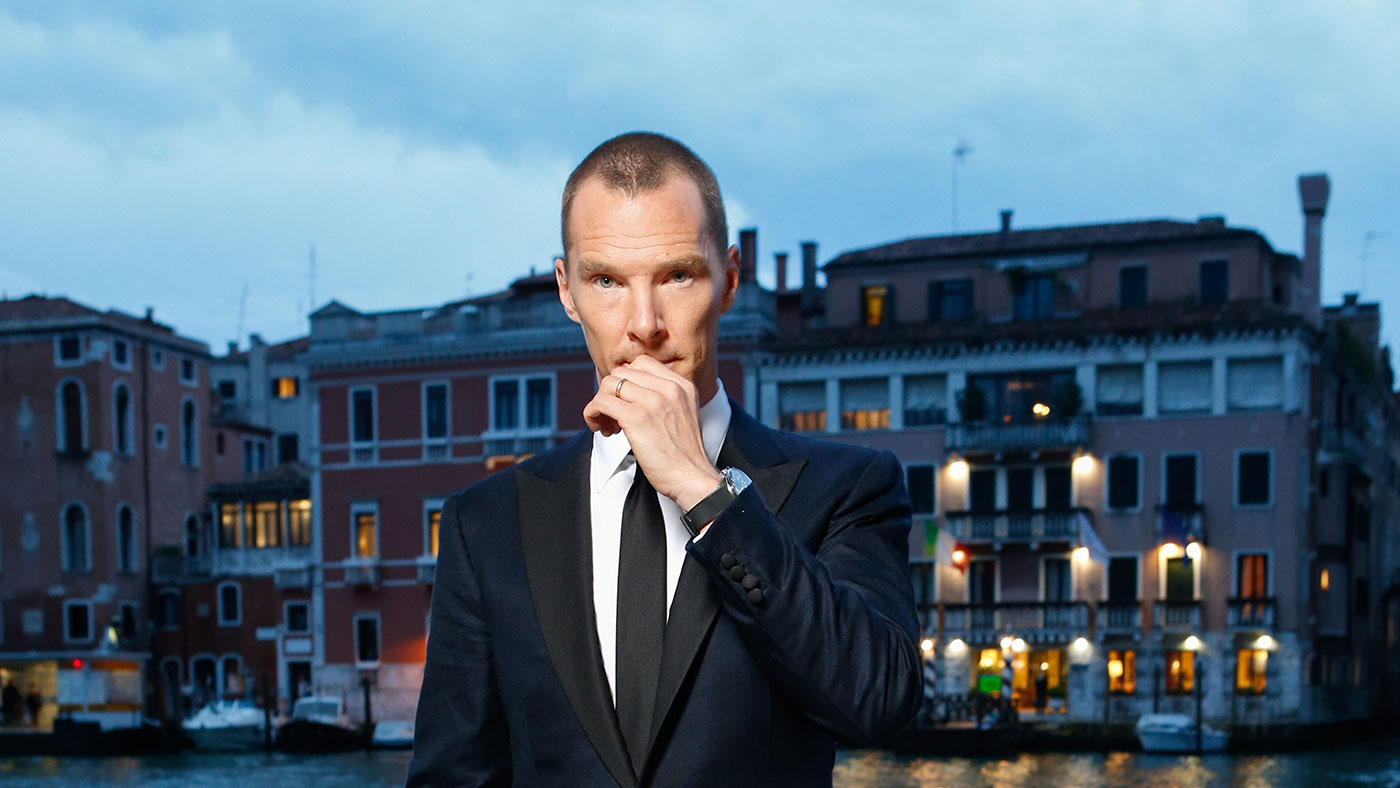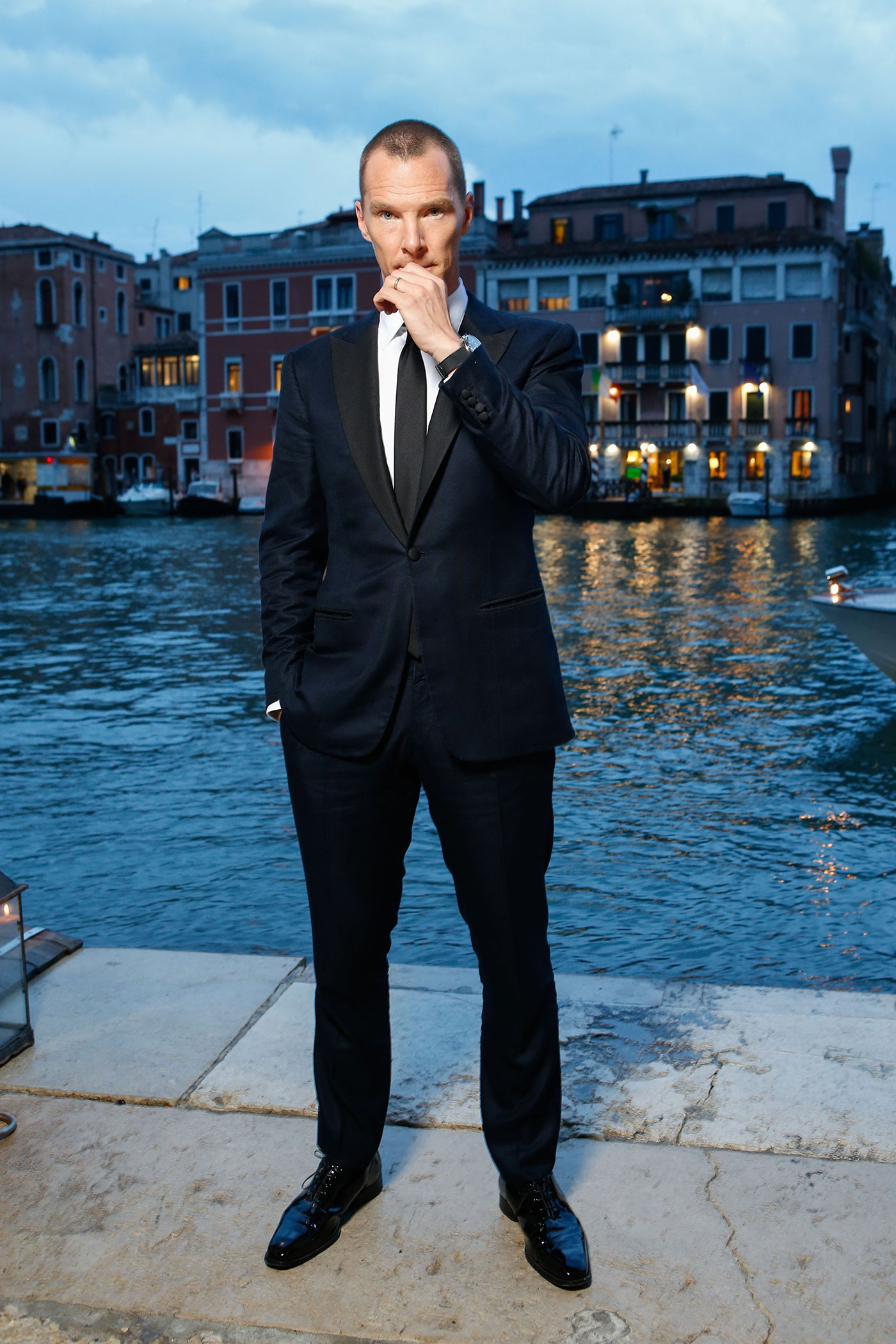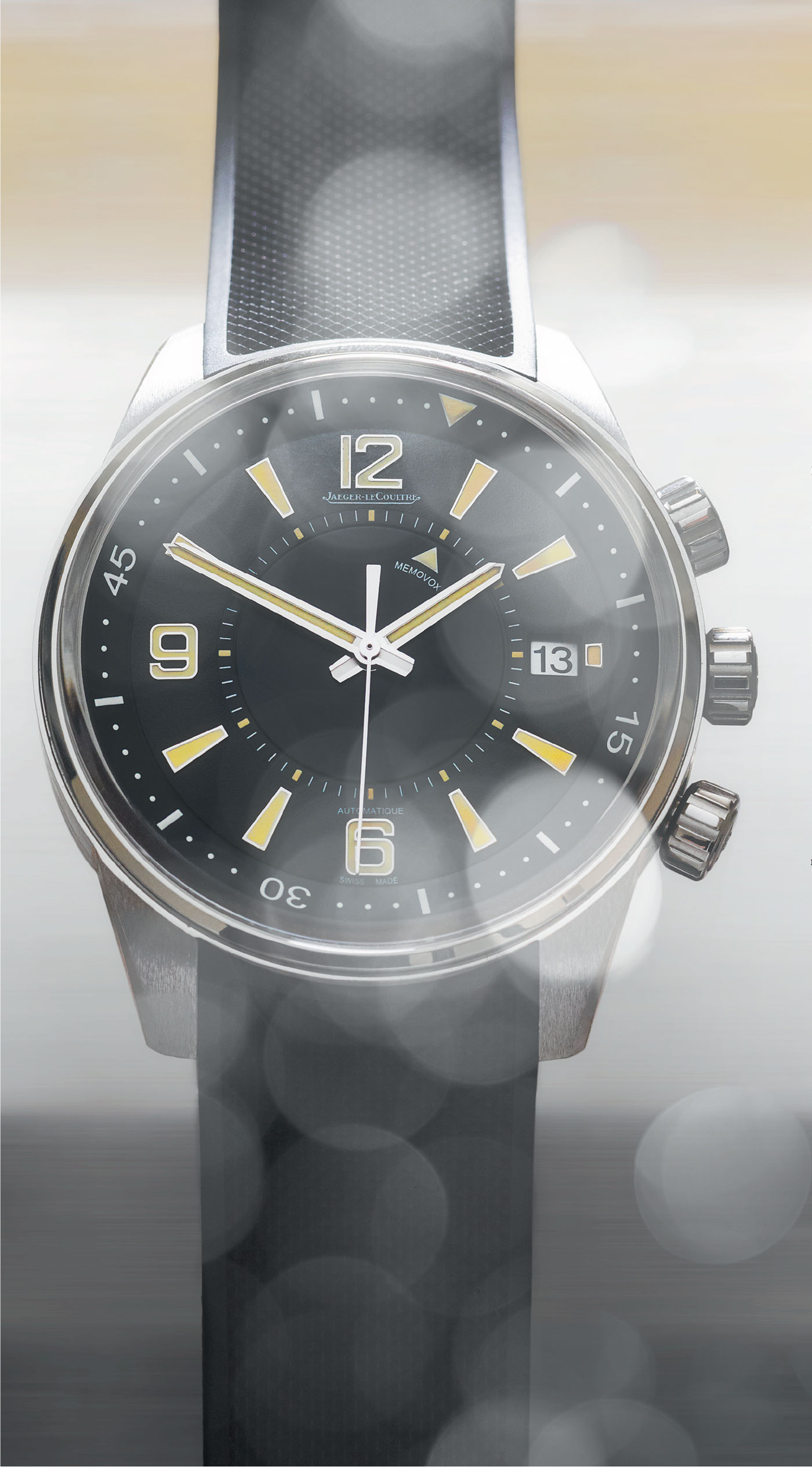Man of his time: Benedict Cumberbatch interview
The Sherlock star on complex characters, passion projects and his directorial ambitions

A free daily email with the biggest news stories of the day – and the best features from TheWeek.com
You are now subscribed
Your newsletter sign-up was successful
Benedict Cumberbatch sits beneath a pale pink gazebo in a quiet courtyard of the San Clemente Palace Kempinski hotel in Venice, finishing his penultimate interview of the day. Sporting a new buzz cut and dressed in a cream linen suit with a light blue shirt, the British actor looks suitably soigné and laid-back, exuding magnetic charm. Cumberbatch’s charisma has earned him near cult worship as a sex symbol, in addition to his reputation as a great talent with an extensive acting range; his protean skill set has allowed him to explore opportunities across the board, coasting through Shakespeare adaptations, independent cinema productions, highbrow television projects and big-budget Hollywood gigs.
Cumberbatch is naturally drawn to complex and oblique characters. His Bard villains have won him much praise: he was nominated for a BAFTA for his performance as Richard III in the BBC series The Hollow Crown: The Wars Of The Roses, and his star turn as Hamlet at the Barbican Theatre in 2015 is the stuff of legend, not least because it became the fastest selling event in London theatre history.
On film, Cumberbatch has morphed into psychologically complex personalities including Stephen Hawking (Hawking), Julian Assange (The Fifth Estate) and Alan Turing (The Imitation Game). Even his most famous fictional characters – Sherlock Holmes and Marvel superhero Doctor Strange – are complicated and contradictory. Invariably, his performances command column space and beget intellectual discussion, whether he’s lending his voice to a dragon so villainous he’s almost Shakespearean (Smaug in the Hobbit movies), or playing a supporting role such as Peter Guillam in Tinker Tailor Soldier Spy, whose armour is stripped away when he’s forced to conceal his sexuality. His next role, as Dominic Cummings in the yet-to-be-aired television movie Brexit, has already caused a stir.
The Week
Escape your echo chamber. Get the facts behind the news, plus analysis from multiple perspectives.

Sign up for The Week's Free Newsletters
From our morning news briefing to a weekly Good News Newsletter, get the best of The Week delivered directly to your inbox.
From our morning news briefing to a weekly Good News Newsletter, get the best of The Week delivered directly to your inbox.
Back to the hidden courtyard in Venice and a storm is brewing. Rain and lightning are forecast, and the sky is marbled with gloomy grey clouds. This is perhaps not the weather that the organisers of the 75th Venice International Film Festival had hoped for, but the setting is certainly cinematic. I’m here as a guest of Jaeger LeCoultre, official partner of the film festival for a 14th consecutive year; Benedict is the marque’s new ambassador, which works rather well as Jaeger LeCoultre is the king of understated elegance, a serious watchmaker known for its classically styled timepieces and consistent innovation. It’s also a company that embraces charming, well-considered idiosyncrasies, but more on this later.

As it turns out, the British actor is less relaxed than he looks – though ever so polite. “I would get up, but all these flagstones are moving,” he says apologetically as he shakes my hand while maintaining a grip on his chair. The gazebo has been erected on a raised platform, like some kind of ceremonial tent, but the ground is wobbly and uneven. “Tread carefully because if you stand on the wrong one you could just go zip!” he says, merrily, using one hand to indicate a headlong disaster.
We begin by discussing his most recent “passion project”, Patrick Melrose, the critically acclaimed five-part TV drama based on Edward St Aubyn’s semi-autobiographical novels. Cumberbatch is superb as the titular character, a man haunted by his traumatic childhood but blessed with a mordant wit underpinned by a caustic regard of Britain’s upper classes, into which he was born. The actor has spoken at length about the series, which aired in May, but it’s clear that none of his enthusiasm for the project – produced by his independent film and TV production company SunnyMarch – has faded. He can still recite his lines; he remembers the finer details of each novel, their atmospheric descriptions and playful literary devises; he even talks about the café where he first met executive producers Michael Jackson and Rachael Horovitz, who own the rights to the books.
An erudite raconteur, Cumberbatch is someone you instinctively want to learn from. If you’re in any doubt about this, listen to his audiobook narration of The Order Of Time, a deeply engrossing exploration of different notions of time, written by best-selling author and theoretical physicist Carlo Rovelli. The book is beautifully executed thanks to Rovelli’s masterful ability to contextualise complex scientific theories, but Cumberbatch – his words slow, deep and enunciated – can be credited for giving the ‘story’ an instructive and meditative quality.
A free daily email with the biggest news stories of the day – and the best features from TheWeek.com
Science – and, in particular, the concept of time – is a theme that runs through much of the actor’s work. His portrayals of Professor Hawking and Alan Turing are obvious examples of this, but there are also subtler ways in which time is distorted for the characters he plays. The story of Patrick Melrose presents a man’s life as a series of epochs rather than a straightforward cycle; The Child In Time, the screen adaptation of Ian McEwan’s novel of the same name, cuts back and forth in time as a way of enhancing the displacement felt by a grieving parent; Sherlock was partial to flashbacks, and Doctor Strange can actually manipulate time with his bare hands. Am I seeing something he isn’t?
“I don’t think have an obsession with time. I mean, maybe I do, maybe I don’t know myself well enough to admit it,” he laughs. “I have had experiences – I think we all have, be they tragic or euphoric or unexpected – where time becomes a very different entity. You feel it slowing down or speeding up or stopping altogether. It’s always fascinating, and I think the older you get, the more aware you are of your own time. That’s a very natural thing to experience.
“Life is often just to do with realising what I can achieve and what I can’t achieve in a certain amount of time. I still find that very difficult, but I’m very overambitious about it. I have to admit that I’m bad at timekeeping. I’ve improved recently, but I can imagine my friends reading this and saying, ‘You’re always f ***ing late!’”
Cumberbatch wears a limited- edition 50th anniversary revival of the marque’s classic diver’s alarm watch. The irony of carrying around a miniature alarm is not lost on the apparently less-than-punctual actor, but, as he explains, it’s the pitch he loves rather than its literal function: “It’s a beautiful sound like an internalized little alarm clock,” he says, attempting to imitate the noise. “It’s like Rob Brydon is trapped inside, pretending to be a bell!”
His lack of punctuality may infuriate his friends, but what Cumberbatch does possess is great comic timing and an endearingly off-kilter sense of humour. At one point during the interview, he’s distracted by his hair and make-up artist Donald, who has suddenly appeared beneath the gazebo. “I love the way you’re standing there facing the roses as if you’re a waiter discreetly waiting for me to hand back the PDQ machine with my pin in it!” he says, ribbing his friend. “Are you happy? Donald? Speak to me!”
Listeners of the Radio 4 sitcom Cabin Pressure will remember his turn as the hilariously awkward Martin Crieff, the show’s incompetent airline captain. On screen, Cumberbatch has yet to play a standalone comedic role, although his witty delivery shines through in Doctor Strange and, indeed, Patrick Melrose, lending these two very different characters more substance; a fallibility that engenders more empathy in the viewer.
Cumberbatch recently visited the Jaeger LeCoultre manufacture in Switzerland, so what did he make of such a sanitised and quietly focused atmosphere, given the hectic nature of filmmaking and its ever-changing scenarios and locations? “Before I visited the manufacture, I didn’t really know about the ateliers, or even about the ateliers, or even much about theVallée de Joux,” he admits. The valley is the sacred home of Swiss watchmaking and an area of unspoilt natural beauty – green, mountainous and chocolate-box perfect. “I didn’t quite know how manual, dexterous and analogue the process was, to be honest,” he says of the work performed in the workshops. “There was [an artisan] creating the most amazing enamelled reproduction of Seurat’s Bathers [At Asnières] in miniature on the back of a Reverso watch. Another was assembling a tourbillon by hand, like a beating heart being started. I just thought, ‘Wow!’ I mean, it actually looks like a heart, doesn’t it?”
It’s clear that Cumberbatch is genuinely impressed by the level of detail that goes into a Jaeger LeCoultre timepiece. Delicate operations on pieces that have required hours and hours of minute manipulation – from engraving and hand-chamfering to enamelling and mirror-polishing – really are executed by hand, and not even nano errors can be edited out.
The Queen is also a fan: she wore a Jaeger LeCoultre diamond bracelet watch on her Coronation Day in 1953. The now-legendary Calibre 101 model – two new pink gold versions of which have been released in time for the Venice Film Festival – is set with baguette diamonds and powered by a micro engine, which, to this day, remains the world’s smallest It is the quaint nature of the watchmaker’s inventiveness that makes Jaeger LeCoultre the perfect fit for Cumberbatch and vice versa: the actor is made for storytelling, and Jaeger LeCoultre has many to recount. For example, he is surprised and delighted to learn that in the ’50s the marque released the Memovox Parking, a watch made for the modern car owner, with an alarm function that reminded its wearer to top up the parking meter.
As the interview approaches its end, we have time to discuss SunnyMarch, the production company that Cumberbatch runs with friend and business partner Adam Ackland. “As a producer, you have a completely different hat on,” says the actor. “Script-wise [for Patrick Melrose] you’re looking at where [the writing] gets too ‘overcrowded’ or complicated for a television audience [watching] over five episodes. What dare we or don’t we lose? There are many other constraints to consider, such as budget, location, time, and the availability of actors. All those things come into the equation. So that was a wonderful thing to exercise.”
Producing, it seems, may also be a springboard to an even greater ambition, as Cumberbatch later divulges: “I would love to have my hand in the till one day and do a bit of directing, to experience what it is to have all the ingredients and do that assembly myself.” While directing may well be on the cards, performing remains his true passion. “As an actor, you can’t be precious. Well, personally I know I can’t. It’s the same as doing live performance: you do that night and then you let go. If you think too hard about how you want to do things differently [the next time], you’re dead in the water. The audience will be different and the joke will fall flat, or the moment will feel phony because you’re reaching for a memory instead of being in the present. So ‘cancel and continue’, as the great Dame Judi Dench says.”
It’s time to go. Cumberbatch’s agent is anxious that he might be late for tonight’s event: a black-tie dinner to celebrate the art of filmmaking, staged at the 15th-century Palazzo Pisani Moretta and hosted by Jaeger LeCoultre. Benedict is due to open the evening’s proceedings with a one- off Letters Live performance. Letters Live is the literary initiative, set up in 2013, in which famous actors, musicians, directors and academics read out memorable letters from history. It’s simple, pure entertainment, but more importantly the reading charmingly cements the storytelling connection between brand and ambassador.
As I leave the courtyard, something rather surprising happens: Cumberbatch catches up with me near the hotel entrance. He has been thinking about the question of time and how it relates to his own acting choices. “Time... well, it’s Shakespeare,” he says. “It’s everywhere in Shakespeare.” And with that, just like Doctor Strange, he’s gone. Maybe he’s just a little time-obsessed after all.

The Jaeger LeCoultre Polaris Memovox
Alexandra Zagalsky is a London-based journalist specialising in luxury, art and travel. She began her career working on a cultural guide for English-speaking expats in Paris, where her first major break was an interview with Lionel Poilâne, the late baker of Saint-Germain-des-Prés famed for his signature sourdough loaves. Returning to London in her early 20s, she went on to write for not only The Week but also The Art Newspaper’s Art of Luxury supplement, The Telegraph and The Times, as well as art and design platforms including 1stDibs’ Introspective Magazine and the magazines of the V&A, Sotheby’s and Christie’s. She studied fine art and art history at Goldsmiths, University of London and continues to explore travel journalism through the lens of art, craftsmanship and culture.
-
 Samurai: a ‘blockbuster’ display of Japanese heritage
Samurai: a ‘blockbuster’ display of Japanese heritageThe Week Recommends British Museum show offers a ‘scintillating journey’ through ‘a world of gore, power and artistic beauty’
-
 BMW iX3: a ‘revolution’ for the German car brand
BMW iX3: a ‘revolution’ for the German car brandThe Week Recommends The electric SUV promises a ‘great balance between ride comfort and driving fun’
-
 Munich Security Conference: a showdown between Europe and Trump?
Munich Security Conference: a showdown between Europe and Trump?Today’s Big Question Report suggests European leaders believe they can no longer rely on the US for military support – but decoupling is easier said than done